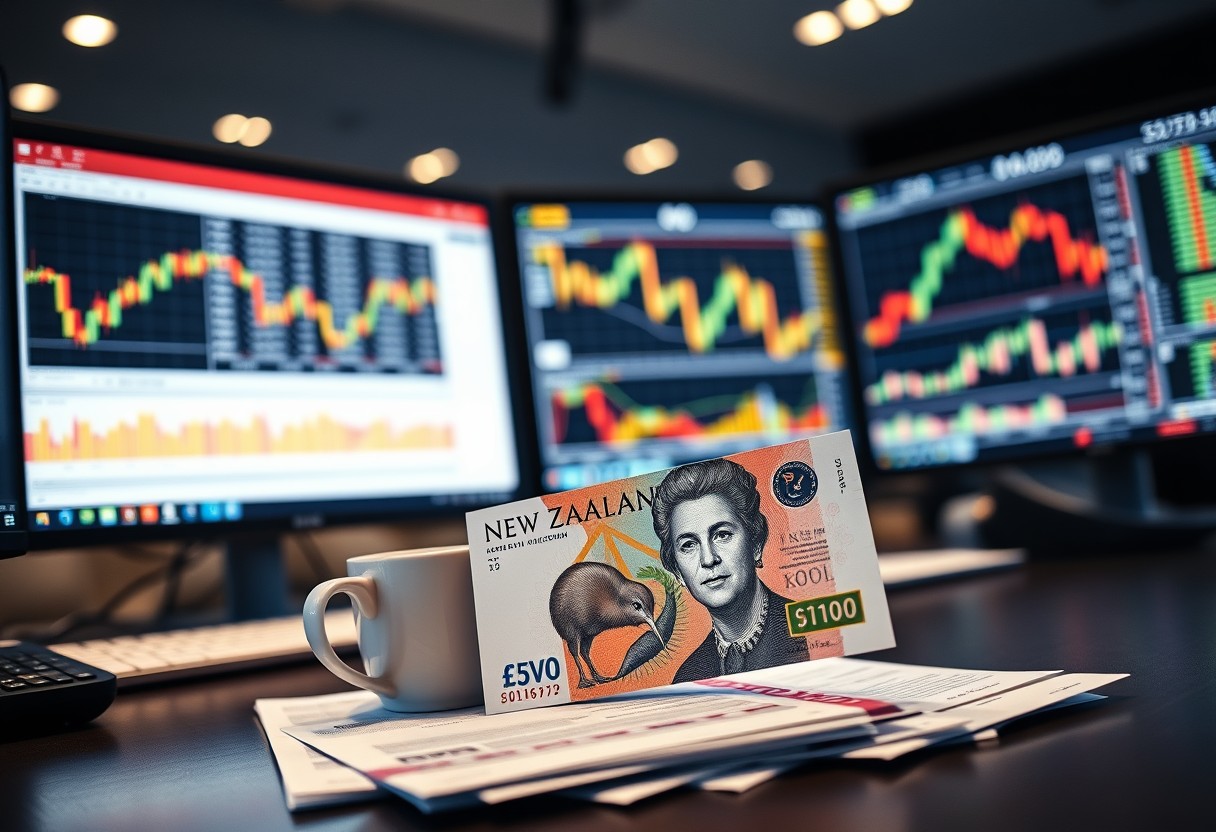You are about to discover the remarkable story of Andrew Krieger, a trader who turned the New Zealand dollar, affectionately known as the Kiwi, into a lucrative opportunity. By employing innovative strategies and a keen understanding of market dynamics, he achieved extraordinary profits while navigating high-stakes risks typical of Forex trading. This guide will provide you with insights into Krieger’s methods and techniques, allowing you to enhance your own trading skills and potentially replicate his success in the competitive world of foreign exchange.
Key Takeaways:
- Strategy: Andrew Krieger employed a highly leveraged trading strategy to maximize profits on the New Zealand dollar (Kiwi).
- Research: He conducted extensive market analysis and utilized both technical and fundamental analysis to make informed trading decisions.
- Risk management: Krieger understood the importance of risk management and implemented strict measures to protect his capital.
- Timing: Successful trades were made by carefully timing entries and exits, capitalizing on market volatility.
- Leverage: He took advantage of leverage in forex trading, which can amplify both gains and losses.
- Market sentiment: Krieger had a keen sense of market sentiment and was able to predict movements based on economic indicators.
- Psychology: Maintaining strong trading discipline and psychological resilience significantly contributed to his trading success.
Types of Forex Trading
While exploring the world of Forex trading, you’ll encounter various styles suited to different risk appetites and trading strategies. Here are some common types:
| Spot Trading | Immediate exchange of currencies at current market rates. |
| Futures | Agreements to buy or sell currencies at a predetermined price on a specific date. |
| Options | Contracts that give you the right, but not the obligation, to buy or sell currency. |
| Scalping | Quick trades to exploit small price movements. |
| Day Trading | Opening and closing trades within the same day. |
This variety provides you with numerous strategies to increase your trading portfolio effectively.
Spot Trading
Spot trading entails the immediate exchange of currencies at the current market rate, which is beneficial for those seeking quick transactions without delays. (You need to have a solid understanding of current market trends to make informed decisions.)
Futures and Options
Options provide flexibility with the right to buy or sell currency at a future date, while futures bind you to a contract. (Understanding these instruments is vital for mitigating risks.)
Forex futures and options are both important derivatives that require comprehensive market knowledge. You can leverage them for risks diversification and profit maximization. Futures obligate you to execute your trade at a set price, which can lead to substantial gains or losses, depending on the market movement. Conversely, options limit your loss risk while allowing greater adaptability in your trading strategy. (Considering your risk tolerance is vital when engaging with these financial instruments.)
Key Factors Influencing the Kiwi
Even with its popularity, trading the Kiwi involves understanding various key factors that can influence its value. These include:
- Economic Indicators
- Market Sentiment
- Commodity Prices
Thou must be aware of how these aspects interplay to make informed trading decisions.
Economic Indicators
While the economic indicators of New Zealand, such as GDP growth and employment rates, provide insights into the health of the economy, they also serve as vital tools for your trading strategy. (Monitoring the Reserve Bank of New Zealand’s decisions about interest rates is particularly important.)
Market Sentiment
While market sentiment can significantly affect the Kiwi and your trading outcomes, it’s crucial to gauge trader attitudes and market trends accurately. The sentiments surrounding global economic conditions, geopolitical tensions, and risk appetite greatly sway the Kiwi’s performance.
For instance, during times of economic uncertainty, you might observe an influx of traders seeking safe-haven currencies, causing the Kiwi to depreciate. Conversely, positive news on commodities or strong domestic data might boost the Kiwi’s demand. Therefore, staying updated on these market sentiments allows you to anticipate potential movements in the currency.

Step-by-Step Guide to Trading the Kiwi
Keep your focus sharp and follow these important steps to successfully trade the Kiwi. This guide will help you navigate the Forex market with precision.
| Step | Description |
|---|---|
| 1 | Select a Broker |
| 2 | Set Up Your Trading Account |
| 3 | Analyze the Market |
| 4 | Execute Your Trades |
| 5 | Monitor Your Positions |
Setting Up Your Trading Account
While establishing your trading account, choose a reputable forex broker that meets your needs. (Selecting the right broker can significantly affect your trading success.)
Analyzing the Market
Guide your strategy by consistently analyzing market trends and economic indicators. (Understanding these factors can help you make informed trading decisions.)
Your analysis should focus on fundamental and technical aspects of the Kiwi. Pay attention to interest rates, employment data, and overall economic health in New Zealand as these can heavily influence currency value. Stay updated with market news, as this can make or break your trading decisions.

Tips for Successful Kiwi Trading
Once again, successfully trading the Kiwi involves a blend of strategies to maximize your profits. Consider these tips to enhance your trading experience:
- Stay informed about the New Zealand economy.
- Watch for interest rate changes.
- Utilize technical analysis indicators.
- Implement a solid risk management strategy.
Assume that applying these tips increases your chances of trading success significantly.
Risk Management Strategies
Little attention to risk management can lead to devastating losses. You should set strict stop-loss orders to protect your capital and define your risk-reward ratio before entering any trade. (This decision is vital in preserving your trading account.) Properly managing your risk allows you to stay in the game longer and capitalize on future trading opportunities.
Leveraging Technical Analysis
Management of your trades is imperative, and utilizing effective technical analysis will guide you through the process. By analyzing trends, support and resistance levels, and chart patterns, you can make more informed trading decisions. Leverage moving averages and RSI to gain insights into market momentum. Employing these tools enables you to identify potential entry and exit points. However, always be cautious; relying too heavily on technical indicators without considering market fundamentals can lead to false signals and losses.
Leveraging technical analysis in Kiwi trading allows you to analyze price movements and trends efficiently. The more informed your decisions are based on solid analysis, the greater your potential to achieve successful results. Utilize a combination of indicators and patterns, while continually adjusting your approach based on market shifts, helps you stay ahead. Always balance your analytical insights with a strong risk management approach to protect your investments.

Pros and Cons of Trading the Kiwi
Your journey into trading the Kiwi can be enhanced by understanding its pros and cons. Here’s a breakdown to guide your decision-making:
| Pros | Cons |
|---|---|
| High volatility provides profit opportunities | Potential for significant losses |
| Access to a diverse economic sector | Sensitive to global commodity market changes |
| Strong trading community and resources | Lower liquidity compared to major currencies |
| Continuous news updates and analysis | Political and economic instability risks |
| Favorable interest rate differentials | Requires constant market monitoring |
Advantages of Trading the Kiwi
There’s a wealth of advantages when considering the Kiwi for trading. It is characterized by high volatility, which can lead to substantial profit opportunities. As a trader, you also benefit from access to New Zealand’s diverse economic sector, providing valuable insights and analysis. Plus, a strong trading community offers resources and support to enhance your trading decisions.
Potential Risks and Challenges
To navigate the Kiwi market successfully, you must be aware of its potential risks and challenges. Factors such as political instability and global commodity price fluctuations can affect your trades dramatically. Furthermore, the Kiwi’s lower liquidity compared to major currencies may lead to larger spread costs.
Kiwi trading, while lucrative, comes with significant challenges you must persistently manage. The currency’s sensitivity to economic announcements can produce sharp price movements, impacting your positions unexpectedly. Additionally, a lack of liquidity means you might face slippage, resulting in executing trades at worse prices than anticipated. Ensuring you stay updated on global trends and implementing robust risk management strategies are key to navigating these potential downsides.
Summing up
With these considerations, you can appreciate how Andrew Krieger leveraged market insights and innovative strategies to generate substantial profits trading the Kiwi. By harnessing knowledge of economic factors, employing disciplined risk management, and seizing timely opportunities, you can adopt similar principles in your own Forex trading endeavors. His story serves as a compelling reminder of the potential for success in the foreign exchange market when you stay informed and strategically approach your trades.
FAQ
Q: What was Andrew Krieger’s trading strategy in the Forex market?
A: Andrew Krieger’s trading strategy primarily revolved around his in-depth analysis and understanding of currency movements. He was known for his aggressive approach, particularly in short selling. By leveraging significant information about economic factors influencing currencies, Krieger made calculated bets against currencies like the New Zealand dollar (Kiwi) when he believed they were overvalued, allowing him to capitalize on price drops.
Q: How did Andrew Krieger identify trading opportunities in the Kiwi?
A: Krieger utilized various analytical tools and market research to identify trading opportunities in the New Zealand dollar. He analyzed economic data, market sentiment, and geopolitical factors that could influence the currency. His ability to spot discrepancies between market perceptions and actual value enabled him to make informed trades that yielded substantial profits.
Q: What was the outcome of Krieger’s most notable trade involving the Kiwi?
A: One of Krieger’s most notable trades involved shorting the New Zealand dollar during a period when he believed it was significantly overpriced. His analysis led him to take a large position against the currency, and when the market corrected itself, he reportedly made a profit of approximately $300 million within a short time frame, marking a significant success in his trading career.
Q: What risk management strategies did Andrew Krieger employ?
A: Andrew Krieger emphasized rigorous risk management in his trading. He focused on using stop-loss orders to limit potential losses, and he only risked a small percentage of his total capital on any single trade. This disciplined approach allowed him to withstand market volatility while maximizing the potential for profit on successful trades.
Q: What lessons can traders learn from Andrew Krieger’s trading style?
A: Traders can learn several important lessons from Andrew Krieger’s approach, including the significance of thorough market research, the value of having a well-defined trading strategy, and the importance of risk management. Additionally, his success highlights the benefits of being prepared to act decisively when market opportunities arise, and understanding the psychology behind market movements.
Q: How did Andrew Krieger’s background contribute to his success in trading?
A: Andrew Krieger’s background in finance and economics provided him with a solid foundation for understanding market dynamics. His educational experience and work with top financial institutions equipped him with the knowledge and skills necessary to analyze complex financial instruments and make informed trading decisions, ultimately contributing to his substantial success in Forex trading.
Q: Is Andrew Krieger’s trading technique applicable for today’s Forex market?
A: While Andrew Krieger’s techniques were highly successful during his trading career, the Forex market has evolved significantly since then. Traders today can still adapt elements of his strategies, such as thorough analysis and risk management, but they must also consider modern market dynamics, technological advancements, and the impact of global events. Continuous learning and adaptation are important in today’s ever-changing trading environment.
Claim Your $60 No Deposit Bonus Here
All you need is to have your live account verified!
Of course, you need to open a live account...
2 Brokers that we like A LOT!
USD30 from each Forex Broker Below.
Both Forex Brokers have excellent rating!
We use both of these brokers and proudly promote them!
NOTE: Not all countries qualify for these bonuses. Terms and Condition Applies.Other Analysis Today


